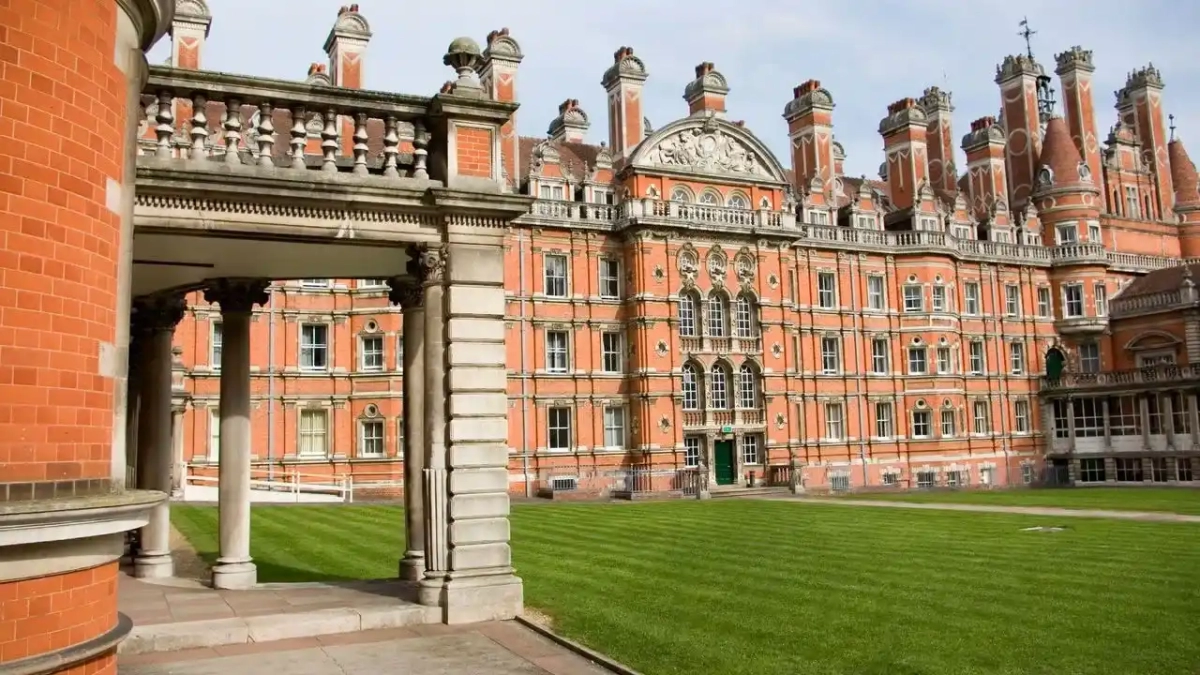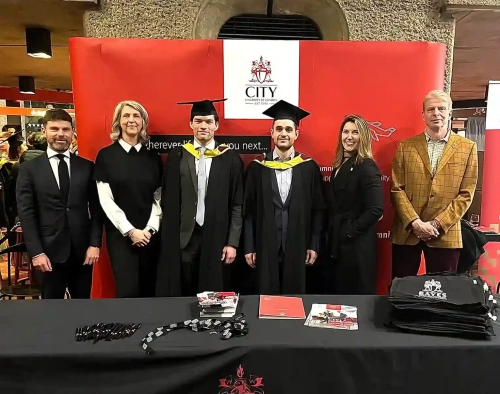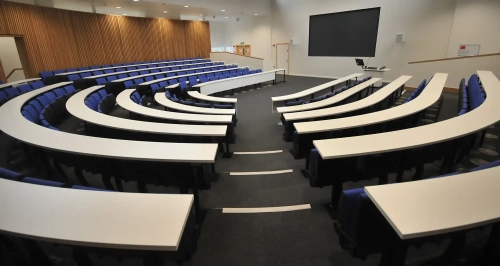City, University of London (now part of City St George's, University of London) is a globally-focused university with a strong emphasis on professional education and research, located in the heart of London. It is a member of the University of London, with a diverse community of students and staff from over 160 countries.
| Acronym | CUL |
| Nickname | CUL |
| Motto / Slogan | To Serve Mankind |
| Colour | Red and white |
| Mascot | City Wolf |
| Founded | 1852 |
| Location | City of London, England, United Kingdom |
| Address | City St George's, University of London Northampton Square London EC1V 0HB United Kingdom |
City, University of London's mission is to transform lives through education, create new knowledge, support business and the professions, and contribute to the global good of society.
City, University of London's vision to be a leading global university committed to academic excellence, focused on business and the professions, and located in the heart of London

City, University of London's main objective is to provide a world-class education that prepares students for successful careers and leadership roles.
We pride ourselves on an innovative approach to education. This approach is intended to support students in becoming analytical and enquiring professionals with an instrumental role in the workplace from their first day.
We are supported in creating new and responsive learning opportunities by the Directorate for Learning Enhancement and Development. This helps to create an integrated learning environment combining physical and virtual learning spaces, enhancing lectures and seminars with online material. Successful educational experiences depend on effective communication between students and staff. We listen to our students, discuss what we do well, and discover where we could do better.
Requirements vary between programmes and full details are published on each of our course pages. However, all entry requirements are based on similar principles.
When you make your application, the actual offer you receive may differ from the requirements listed on the course page. As many of our courses are very competitive, possessing the minimum requirement does not guarantee admission. For some of our courses in the School of Health & Medical Sciences we have selection days that also form an important part of the application process.
All entry requirements for our undergraduate courses can be found on the individual course pages.
English language requirements
To study at City St George's:
We accept a range of international qualifications for entry. The following are City St George's equivalences to UK GCE A-level grades for undergraduate entry requirements.
We accept a range of international qualifications for entry. The following are City St George's equivalences to UK honors degrees for postgraduate entry requirements for each country.
UNDERGRADUATE
POSTGRADUATE
Phone : , +44 (0)207 040 5060, +44 (0)20 8672 9944
Apply For Admission



Northampton Square Library provides printed resources, study spaces (for group study, quiet study and individual silent study), networked PCs and wi-fi across five levels. The library entrance is on the second floor of University Building at Northampton Square.
Located on the first floor of The City Law School Building (Sebastian Street), the Law Library provides printed resources, study spaces (for group and individual silent study) and networked PCs. The library collection comprises books, reports and journals to support the academic and professional law programmes taught at City and is augmented by a large portfolio of online resources.
Located on the first floor of Bunhill Row, the Business Library provides specialist business collections for postgraduate students, study spaces and networked PCs and a Financial Resources Zone offering access to key financial databases and information.
AMBA, AACSB, and EQUIS
Qualifications: PhD, University of Cambridge, United Kingdom, Sep 1990 – Dec 1995; BA (Hons), University of Cambridge, United Kingdom, Sep 1987 – Jul 1990.
Employment: Executive Dean, City St George's, University of London, Dec 2022 – present, Chair, Senate Research Ethics Committee, City St George's, University of London, Aug 2020 – Sep 2022, Deputy Dean, City St George's, University of London, Sep 2019 – Dec 2022, and Professor of Bioethics, City St George's, University of London, Sep 2019 – present.
Helen is an elected member of the Executive of the Association of Heads of University Administration (AHUA).
St George’s Hospital opens in Lanesborough House at Hyde Park Corner. The new hospital spreads over three floors and accommodates 30 patients. By 1744, the hospital grows to accommodate over 250 patients. A formal register of pupils studying under the physicians and surgeons is maintained from 1752. The earliest recorded course of lectures at the hospital is delivered by Sir Everard Home some time before 1803. The eminent anatomist and surgeon John Hunter begins to undertake courses of study at St George’s Hospital. Hunter is often referred to as the Father of Modern Surgery and is the first of many prominent figures in medicine to attend City St George’s. Former student Edward Jenner eventually develops the first vaccination against smallpox, which leads to the eventual eradication of the disease. The hide of Blossom, the cow used in Jenner’s smallpox experiment, was presented to the hospital in 1857 and has remained in City St George’s possession ever since.
The Northampton Institute plays a key role in the First World War with staff and students producing munitions, military optical aids and parts for radio telegraphic stations. All departments also participate in schemes to retrain and find employment for wounded ex-servicemen. Following the fight of the ‘St George’s four’, St George’s Hospital Medical School admits its first female students to aid with wartime staff shortages. Helen Inglby, one of the four women accepted alongside Ethelberta Claremont, Marian M. Bostock and Elizabeth O'Flynn, goes on to become Pathologist of the Albert Einstein Medical Centre in Philadelphia.
The Inns Court School of Law joins The City University and with the Centre for Legal Studies. Together they form The City Law School. The School of Arts is founded at The City University, bringing together the departments of Music, Journalism and Publishing, and Cultural Policy and Management. A dedicated building for the school, now named the Rhind Building in honour of Professor David Rhind, opened the following year.
St George's appoints its first female Principal, Professor Jenny Higham. A consultant gynaecologist who has held several leadership roles in academia, Professor Higham has research interests in reproductive medicine and medical education. She is also Chair of the Medical Schools council. Cass Business School is renamed Bayes Business School after the Reverend Thomas Bayes, creator of the Bayes Theorem. Anthony joined City, University of London from his position as the Government’s Chief Scientific Adviser for National Security, which he held from 2015-2021. Previously he held the positions of Dean of the UCL Faculty of Engineering Sciences and Head of UCL Computer Science. His scientific work is in the broad area of systems engineering.
City, University of London merges with St George’s, University of London creating a powerful multi-faculty institution. The combined university becomes one of the largest suppliers of the health workforce in the capital and one of the largest higher education destinations for London students.